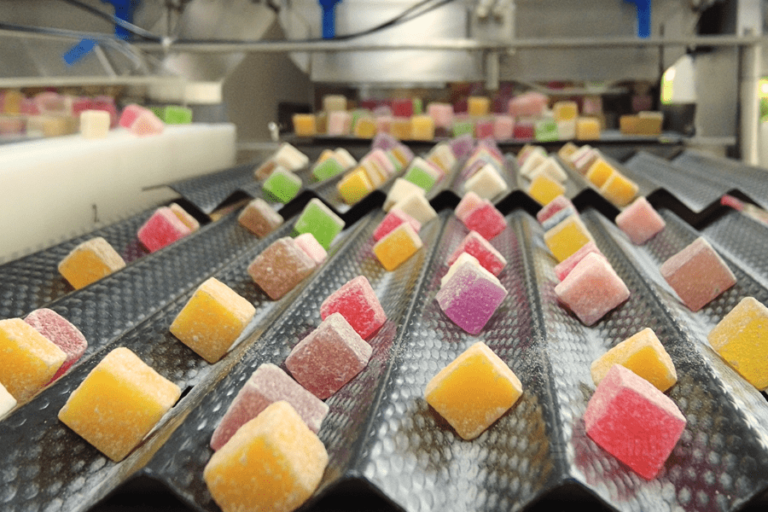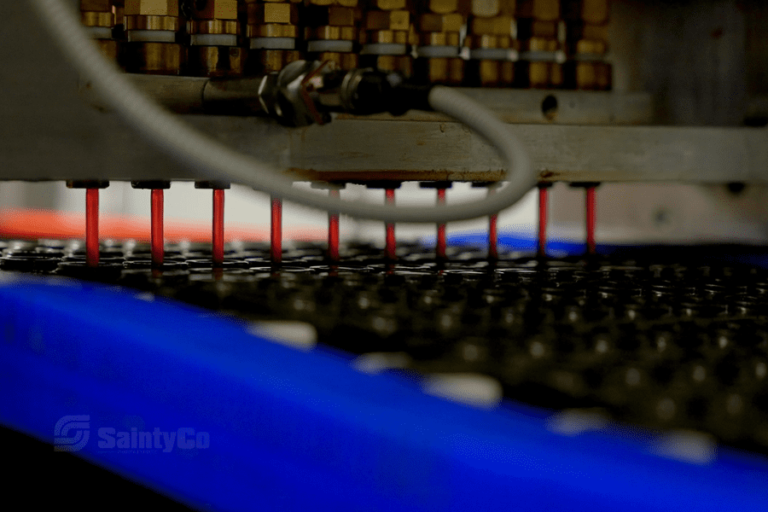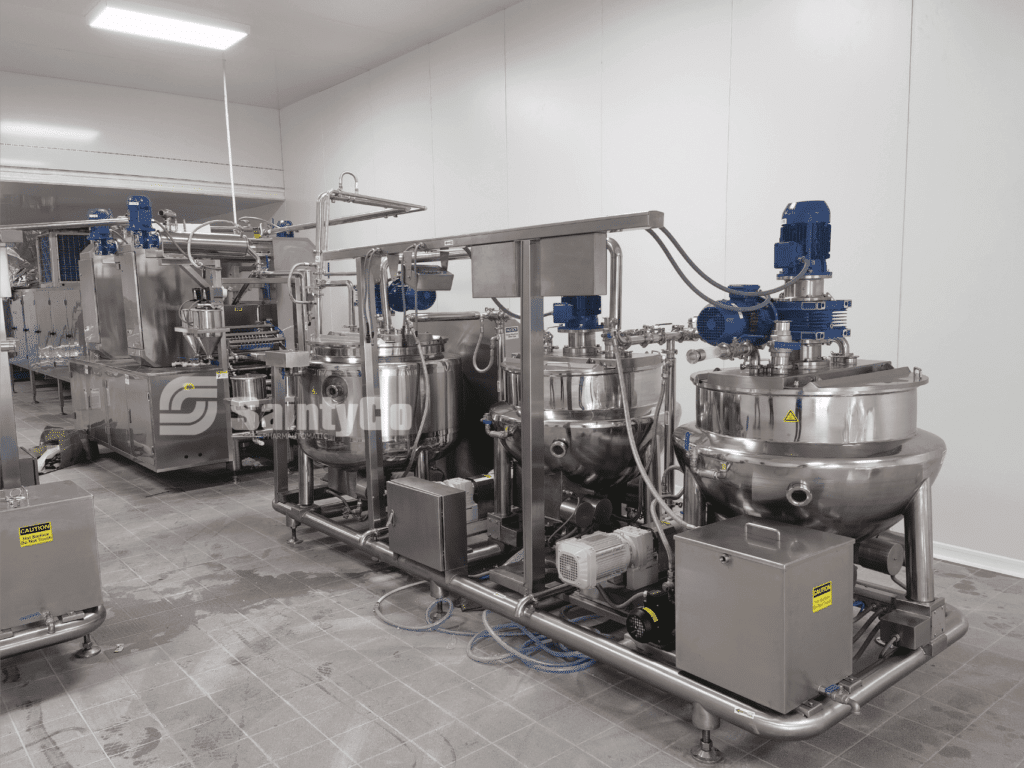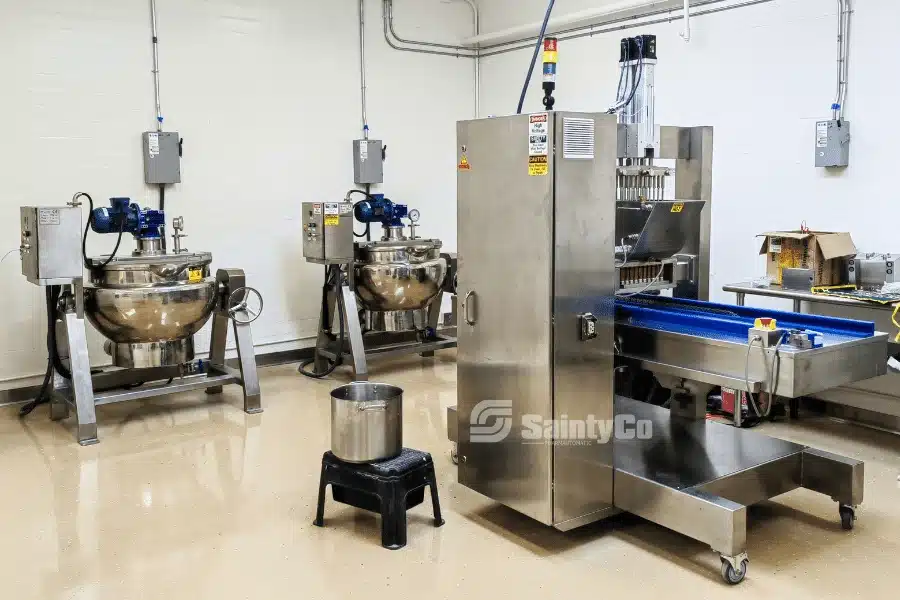Thinking about launching a gummy production line in Mexico? Many entrepreneurs, CBD innovators, and food industry leaders are exploring similar opportunities. With the booming demand for gummy candies, Mexico offers a fertile ground for new ventures.
To launch a gummy production line in Mexico, you must adhere to COFEPRIS regulations, select suitable machinery, and ensure compliance with GMP standards. Here’s a quick overview:
- COFEPRIS Registration: Required for market entry; includes ingredient details and product labeling.
- GMP Compliance: Covers facility hygiene, equipment standards, and staff training.
- Labeling According to NOM: Labels must follow NOM guidelines, in Spanish, with clear consumer information.
- Import Regulations: COFEPRIS-compliant and GMP-certified sources are necessary for imported ingredients.
While these steps provide a foundation, successfully navigating the intricate landscape of regulatory compliance and machinery selection can be challenging. Let's delve deeper into these essential components to help you set up a thriving gummy production operation.
COFEPRIS registration is required for gummy production.True
COFEPRIS regulates health risks in Mexico, requiring product registration.
What Are the Key Regulatory Requirements for Gummy Production in Mexico?
Navigating the regulatory landscape for gummy production in Mexico is crucial for success. Let's explore the key requirements.
To comply with Mexican regulations for gummy production, obtain COFEPRIS sanitary registration, adhere to GMP standards, and follow specific labeling rules. This includes submitting product details for approval and ensuring labels meet NOM guidelines.
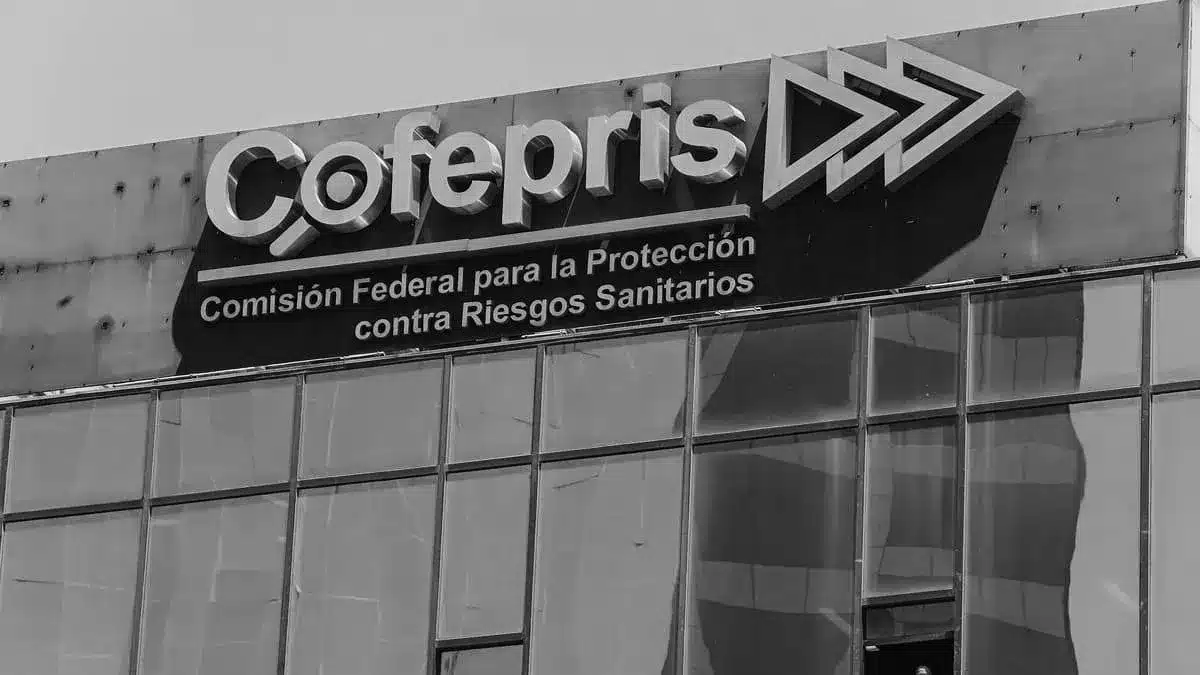
Understanding COFEPRIS Oversight
The Federal Commission for Protection against Health Risks (COFEPRIS) is the cornerstone of regulatory compliance in Mexico's food and dietary supplement industry. As the governing body, COFEPRIS ensures that all products, including gummy supplements, are safe, effective, and properly labeled. It is vital for manufacturers to engage with COFEPRIS early in the production planning stage to ensure all regulatory expectations are met.
Good Manufacturing Practices (GMP)
Adhering to Good Manufacturing Practices is not just recommended but mandatory under Mexican health regulations. These practices encompass a range of standards related to facility maintenance, equipment operation, personnel training, and manufacturing processes. Regular audits and inspections by COFEPRIS ensure these standards are consistently upheld, making compliance a continuous process rather than a one-time checklist. For more on GMP, consider exploring GMP standards1 to gain a deeper understanding.
Sanitary Registration Process
Before any gummy product hits the market in Mexico, obtaining a sanitary registration from COFEPRIS is essential. This registration requires comprehensive documentation, including detailed information about the product's ingredients, intended use, manufacturing process, and labeling. Failure to secure this registration can result in severe penalties and hinder market access.
Labeling Requirements According to NOMs
Labels on gummy products must adhere to Mexican Official Standards (NOMs), which dictate the essential information that must be presented to consumers. This includes an accurate list of ingredients, nutritional content, and any health claims made by the product. Crucially, all labels must be in Spanish and reflect cultural and regulatory norms. To ensure labels meet these standards, manufacturers should refer to Mexican labeling regulations2 during the design process.
Navigating Import Regulations
For producers importing ingredients or finished products into Mexico, COFEPRIS enforces specific regulations that must be followed. These regulations ensure that all imports originate from GMP-certified facilities. Additionally, imported goods may be subject to further documentation or testing upon arrival in Mexico. Import regulations for dietary supplements3 provide detailed guidelines on this process.
Adverse Event Reporting Obligations
Post-market surveillance is an ongoing responsibility for manufacturers. Should any adverse effects related to gummy products occur, these must be reported to COFEPRIS as part of maintaining transparency and consumer safety. This requirement underscores the importance of having robust monitoring systems in place to track product performance once it reaches consumers.
COFEPRIS registration is optional for gummy production.False
COFEPRIS registration is mandatory for market access in Mexico.
GMP adherence is mandatory under Mexican health regulations.True
Good Manufacturing Practices are required to ensure product safety.
How to Choose the Right Machinery for Gummy Manufacturing?
Selecting the right machinery is crucial for efficient gummy manufacturing and regulatory compliance.
When choosing machinery for gummy manufacturing, ensure it complies with local standards, offers flexibility for various formulations, and includes automation for precision. Consider energy efficiency, local support availability, and export certification to align with COFEPRIS regulations and production goals.
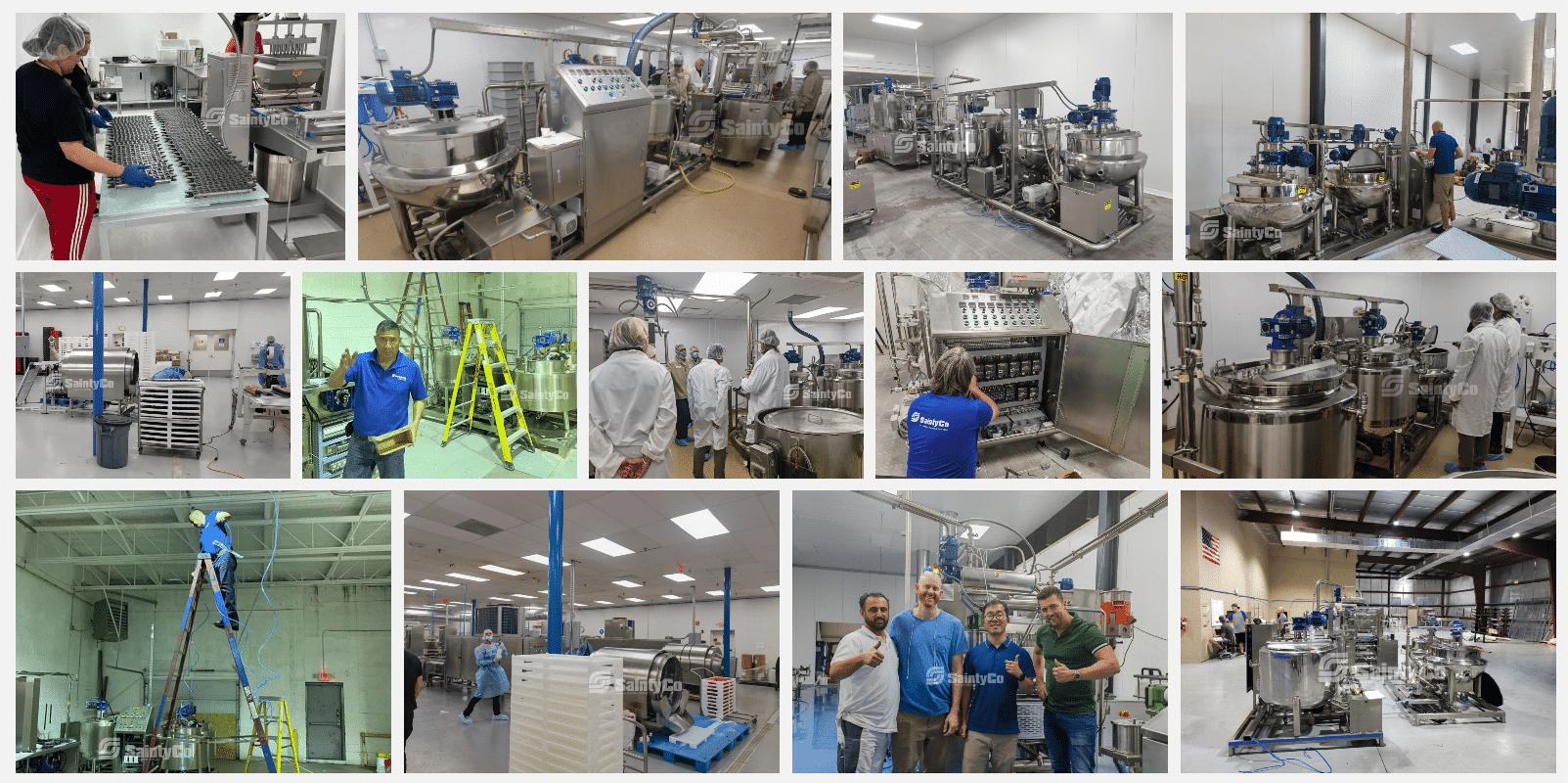
Understanding Compliance with Local Standards
Choosing machinery that adheres to Mexican electrical and safety standards is vital. This ensures not only compliance with local regulations4 but also smooth operation within the production environment. Equipment with readily available local servicing and parts can significantly minimize downtime, ensuring seamless production processes.
Flexibility in Formulation Handling
Gummy manufacturing requires machinery capable of handling diverse formulations involving different types of gelatin and pectin, as well as a range of active ingredients and colorants. The ability to adjust to these variables ensures that the production line remains versatile and compliant with Mexican standards.
Importance of Automation and Control
Automation enhances precision and repeatability in gummy production. Machines equipped with integrated control systems can monitor processing parameters in real-time, ensuring product consistency while reducing waste. This level of control is crucial for maintaining compliance with COFEPRIS regulations5 and optimizing production efficiency.
Energy Efficiency and Environmental Compliance
With Mexico updating its environmental regulations, selecting energy-efficient machines that minimize waste and energy consumption is essential. Such considerations not only support compliance but also contribute to cost savings in the long term.
| Feature | Benefit |
|---|---|
| Local Standard Compliance | Ensures legal operation and reduces downtime |
| Formulation Flexibility | Allows adaptation to various ingredients and market demands |
| Automation & Control | Enhances precision, consistency, and reduces material wastage |
After-Sales Support and Local Assistance
The logistical challenges of operating in Mexico necessitate choosing a supplier with reliable local support. This should include technical assistance, availability of spare parts, and the provision of training in Spanish to ensure optimal machine performance and minimize operational hiccups.
Certification for Export
For manufacturers intending to export, it's crucial to select machinery that meets the regulatory requirements of target markets. This could involve additional certifications such as those from the FDA or EMA, depending on the intended export destinations.
Automation reduces waste in gummy production.True
Automation ensures precision and consistency, reducing material wastage.
Local support is unnecessary for gummy machinery.False
Local support minimizes downtime and ensures seamless operation.
What Are the Best Practices for Ensuring Product Quality and Safety?
Ensuring product quality and safety is paramount in gummy production, influencing consumer trust and regulatory compliance.
Adhering to Good Manufacturing Practices (GMP), conducting regular inspections, and implementing robust quality control measures are key to ensuring product quality and safety in gummy production. These practices prevent contamination, maintain consistency, and comply with regulatory standards.
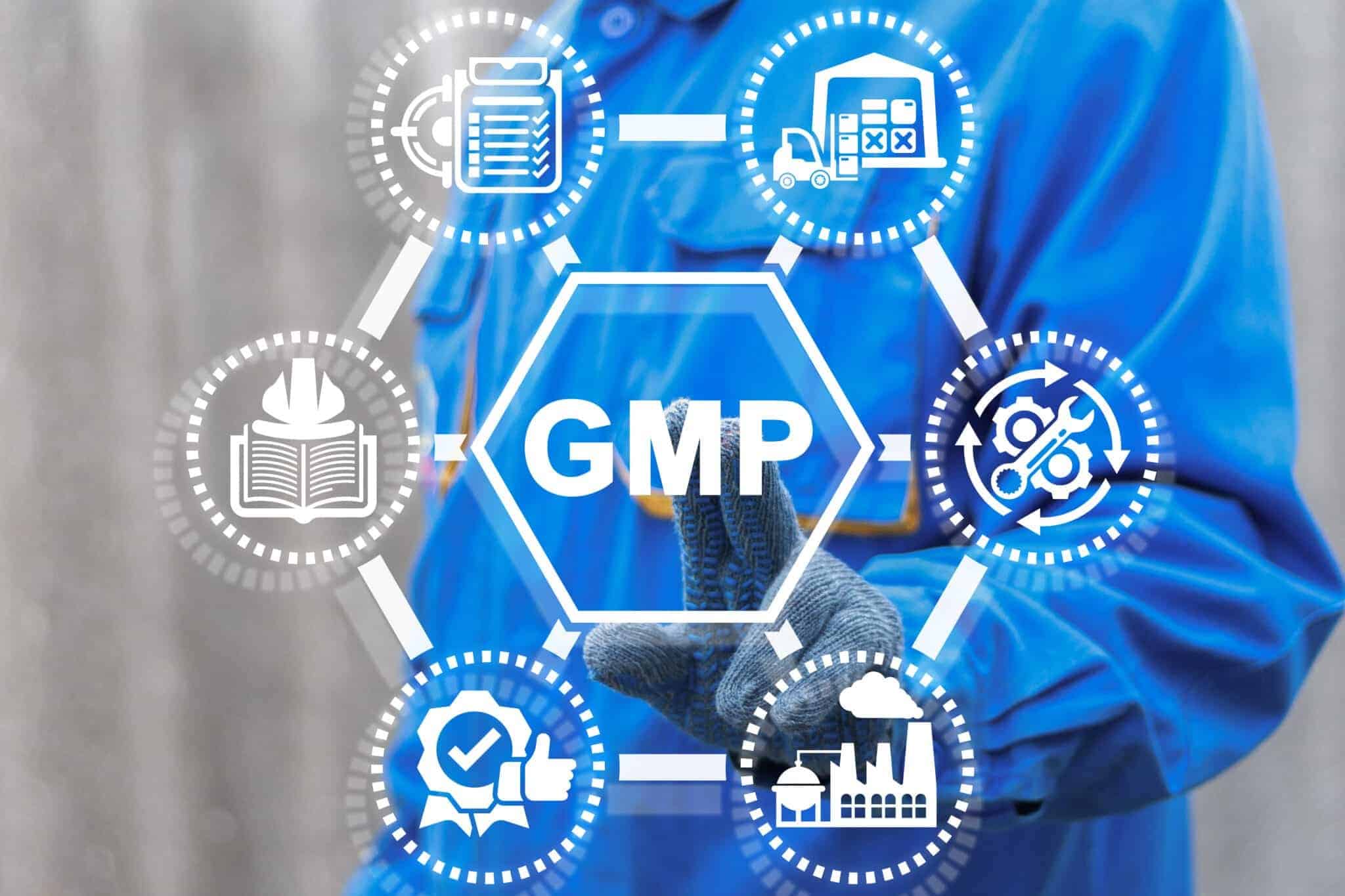
Embrace Good Manufacturing Practices (GMP)
Good Manufacturing Practices (GMP) are essential for maintaining product quality and safety. They encompass a broad spectrum of production elements, including:
-
Personnel Training: Ensure that all employees involved in the production process are well-trained and understand the GMP standards. This reduces human errors and enhances overall product quality.
-
Facility Design and Maintenance: Your facility should be designed to prevent contamination. Regular maintenance checks ensure that all equipment functions optimally, minimizing the risk of product contamination.
Implement Robust Quality Control Systems
Quality control systems are crucial for detecting defects before products reach consumers. Key components include:
-
Regular Inspections: Conduct regular internal inspections to identify potential issues early. These inspections should cover everything from raw materials to finished products.
-
Sample Testing: Implement sample testing at various stages of production to ensure that products meet set standards. This could include tests for potency, purity, and consistency.
| Stage of Production | Test Conducted |
|---|---|
| Raw Materials | Purity and Quality Test |
| During Production | Consistency Check |
| Final Product | Potency Verification |
Leverage Technology for Enhanced Safety
Utilizing technology can significantly enhance product safety:
-
Automated Systems: Automated systems reduce the likelihood of human error. These systems can monitor production parameters in real-time, ensuring consistent quality.
-
Digital Records: Maintain digital records of all production processes to track compliance and facilitate audits. This transparency is crucial for regulatory adherence.
Engage in Continuous Improvement Practices
Continuous improvement is vital for adapting to new challenges:
-
Feedback Loops: Establish feedback mechanisms from both customers and employees to identify areas for improvement.
-
Training Updates: Regularly update training programs to incorporate the latest safety standards and technological advancements.
Regularly Review Regulatory Compliance
Staying compliant with local and international regulations safeguards your operations:
-
Regulatory Updates: Keep abreast of any changes in regulatory requirements, such as those from COFEPRIS6 or international bodies like the FDA.
-
Audit Readiness: Always be prepared for audits by maintaining comprehensive documentation and evidence of compliance across all aspects of production.
GMP prevents contamination in gummy production.True
Good Manufacturing Practices include measures to prevent contamination.
Automated systems increase human errors in production.False
Automated systems reduce the likelihood of human errors in production.
What to Consider When Importing Gummy-Making Machinery into Mexico?
Importing gummy production equipment into Mexico can unlock vast opportunities, but it requires careful planning to navigate regulatory, logistical, and operational hurdles. From regulatory compliance to equipment support, let’s explore what you need to ensure a seamless import and setup.
To successfully import gummy-making machinery into Mexico, prioritize COFEPRIS and NOM compliance, ensure local support for equipment, and verify import documentation requirements. Additionally, energy efficiency and the availability of spare parts are essential for cost-effective operations.
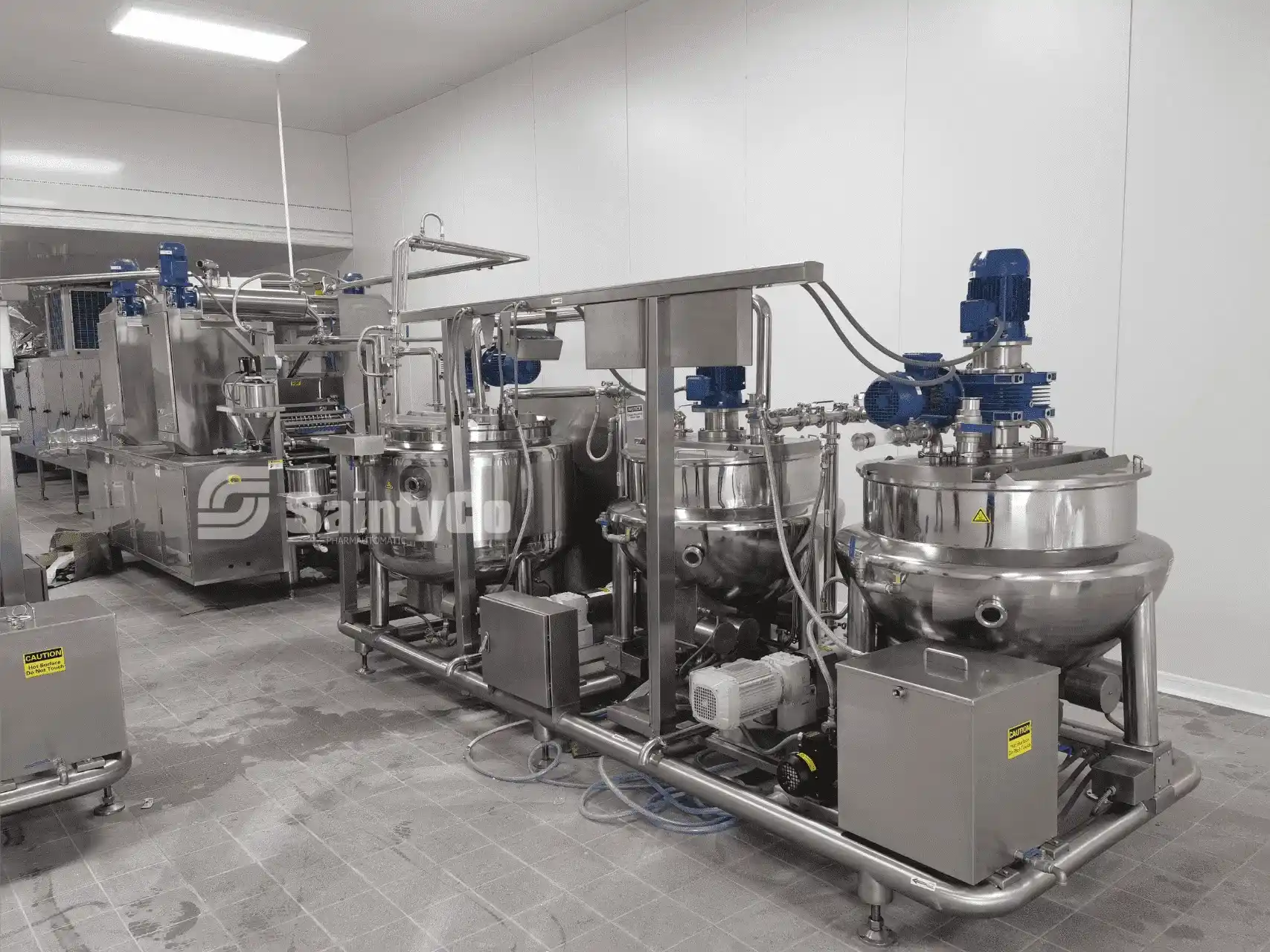
COFEPRIS and NOM Compliance
In Mexico, all imported machinery must meet specific regulatory standards, with COFEPRIS (the Federal Commission for Protection against Health Risks) governing health and safety requirements. Additionally, NOM standards cover electrical safety and hygienic production, which are critical for gummy production machinery. Verifying that your equipment complies with these standards is a necessary step before any machine can be operationally approved. Non-compliance can result in significant delays or rejections during the import process.
Reliable Local Support and Spare Parts Availability
Maintaining imported machinery efficiently often depends on access to local technical support and spare parts. Reliable support within Mexico reduces potential downtime and ensures that repairs or adjustments can be managed quickly. Choosing a supplier with a well-established local network or a service team can be a game-changer for long-term operational stability, reducing costs and minimizing disruptions.
Complete Import Documentation
Mexican customs requires detailed documentation to demonstrate that imported machinery adheres to all applicable health and safety standards. Partnering with a customs agent experienced in COFEPRIS guidelines can streamline the import process, avoiding potential delays. Required documentation often includes certificates of origin, safety certifications, and operational manuals, which are essential for customs clearance.
Energy Efficiency and Environmental Compliance
Given the rising costs of energy and Mexico's environmental standards, selecting machinery with a focus on energy efficiency can lead to considerable cost savings over time. Look for machines that minimize energy consumption without compromising on production quality. This not only helps reduce operational costs but also aligns your business with Mexico's evolving environmental norms, a critical factor in achieving sustainable growth.
| Consideration | Description | Benefits |
|---|---|---|
| COFEPRIS and NOM Compliance | Ensures machinery meets health and safety standards regulated by Mexican authorities. | Avoids import delays and ensures operational legality. |
| Local Support and Spare Parts | Access to local technical support and spare parts for maintenance. | Minimizes downtime and ensures smooth operation. |
| Import Documentation | Complete, accurate documentation for Mexican customs and regulatory bodies. | Reduces customs clearance time and import issues. |
| Energy Efficiency | Machinery designed to consume minimal energy and meet environmental standards. | Lowers operational costs and meets environmental norms. |
By focusing on these key considerations, you can streamline the import process and set up a compliant, cost-effective gummy production line in Mexico. Ready to discuss with us about machinery options that align with these requirements?
Conclusion
Setting up a successful gummy production line in Mexico involves more than just acquiring equipment; it requires a thorough understanding of COFEPRIS regulations, GMP standards, and labeling compliance. By securing the necessary sanitary registration, following NOM labeling guidelines, and ensuring your machinery meets local standards, you'll be well-positioned for operational excellence in this expanding market.
At GummyGenix by SaintyCo, we're here to support your journey with cutting-edge, GMP-compliant gummy manufacturing equipment designed for efficiency, precision, and adaptability. Our machines are fully compatible with Mexican regulatory standards, and we offer reliable after-sales support to keep your operations running smoothly.
Thinking about launching a gummy production line in Mexico? Request a free consultation or request our brochure to explore machinery options that align with your compliance needs. With our expertise, you can confidently navigate the complexities of regulatory requirements and start producing high-quality gummies in no time.

-
Discover comprehensive insights into GMP practices and their critical elements.: Creation and enforcement of Standard Operating Procedures (SOPs). · Comprehensive documentation of all procedures and processes. · Validation of ... ↩
-
Ensure compliance with Mexican labeling rules to avoid legal issues.: Labels must include the product's name, list of ingredients with their respective quantities, recommended dosage, usage instructions, and any ... ↩
-
Learn about necessary documentation for importing dietary supplements.: ➢ Food supplements do not require Import Permit by COFEPRIS. ➢ If the product is not labeled correctly according to Mexican Regulations, it will be with-hold ... ↩
-
Discover comprehensive details about Mexican standards essential for compliance.: NOM-001-SCFI-2018 specifies the safety requirements and test methods for various electronic equipment and its accessories which are powered by electric power. ↩
-
Learn about key COFEPRIS regulations affecting gummy production.: The food supplement must have a COFEPRIS Classification Consultation and Prior Sanitary Import Permit (PSPI) issued by COFEPRIS to import and ... ↩
-
Stay updated on regulatory changes to ensure compliance.: ... COFEPRIS' regulatory standard for the safe processing of food, beverages, or food supplements (NOM 251). The International Fresh Produce ... ↩



